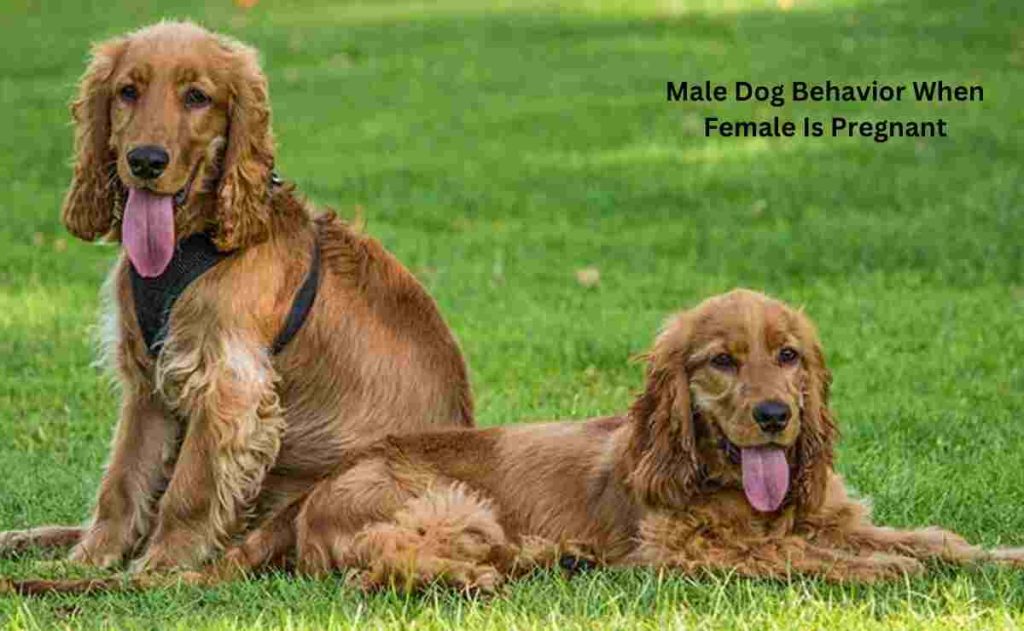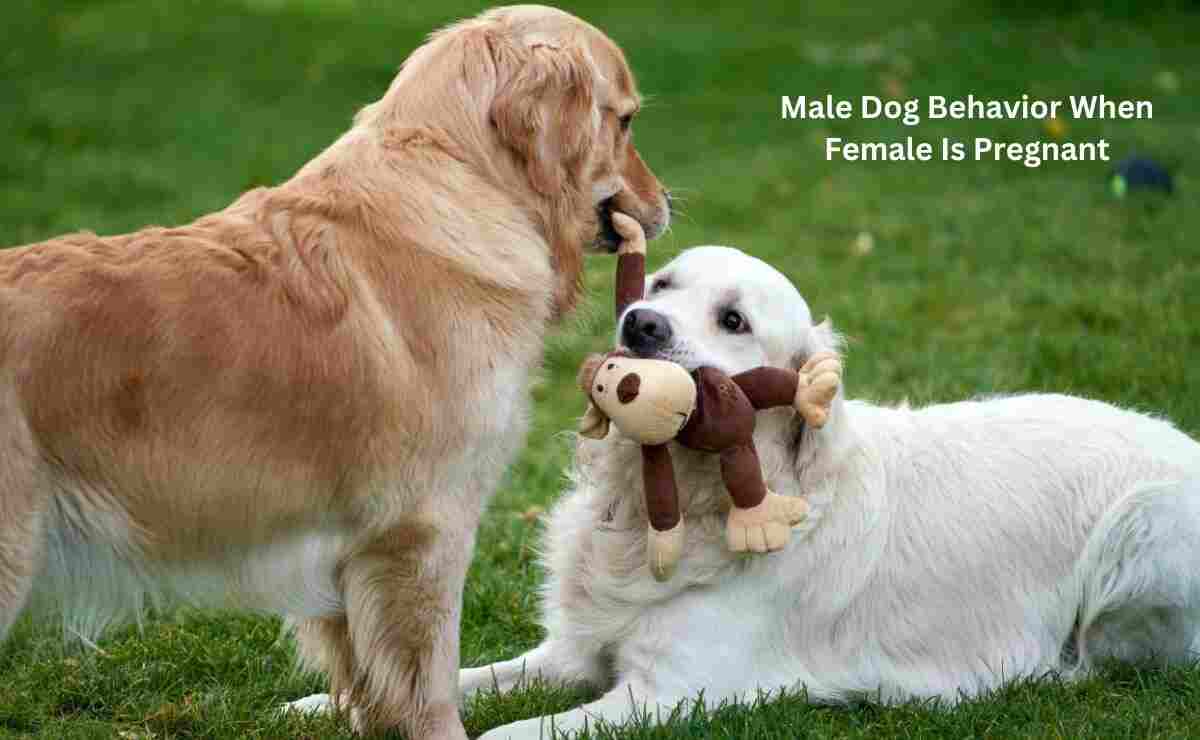Dogs have a heightened sense of detecting their surroundings. When a female dog is pregnant, a male dog can detect the hormonal changes, disposition, and behaviors.
Male dogs aren’t fully aware of the concept of pregnancy. So the owners noticed some weird male dog behavior when female is pregnant. There is a range of behavior that is challenging for the owners to understand and handle them. So here, we will describe the common male behavior during that time that will help you to identify these behaviors.
Do Male Dogs Know When a Female Dog Is Pregnant?
Absolutely, it’s truly amazing how male dogs can sense when a female dog is pregnant. No official diagnosis or pregnancy test is required for them to pick up on these changes in their environment. So, how exactly do male dogs detect it? There are a couple of ways:
The mating process between male and female dogs involves a complex exchange of scents. Both male and female dogs rely on their keen sense of smell to pick up on each other’s pheromones.
Pheromones are like outward signals of what’s happening inside a dog’s body on a hormonal level. These pheromones inform the male dog precisely when a female dog is ready to mate, and changes in these pheromones also indicate pregnancy.
Moreover, male dogs can pick up on a female dog’s pregnancy by observing her behavior and disposition. A pregnant female dog may display noticeable signs such as being more moody, loving, or even showing signs of being unwell. These subtle changes in her behavior are often apparent to the perceptive male dog.
Interestingly, dogs can also apply this ability to detect pregnancy in their human owners. In many cases, they can sense a woman’s pregnancy even before she herself realizes it. It’s like a sixth sense that dogs possess, although not all dogs are equally skilled in this area. Younger and less experienced male dogs may have a harder time sensing a female dog’s pregnancy, but for many, it’s an innate talent.
Male Dog Behavior When Female Is Pregnant

When a female dog is pregnant, it is natural for male dogs to demonstrate certain behavioral changes. For example
Protectiveness: One common behavior observed in male dogs is increased protectiveness and attentiveness towards the pregnant female. They may become more vigilant, guarding the female and showing signs of increased loyalty and affection.
Curiosity: Male dogs have increased curiosity towards the pregnant female. They frequently sniff or investigate her abdomen, as they can likely detect the hormonal changes occurring during pregnancy. It is important to allow this behavior, as it helps male dogs establish a bond with the pregnant female and understand the changes happening in their environment.
Loss of Appetite: Some male dogs also decrease in appetite or become more agitated or restless during this period. These changes in behavior are normal reactions to the presence of pregnancy hormones in the female dog’s body. If these symptoms persist or worsen, it is advisable to consult a veterinarian for further evaluation.
Whining: It is another common behavior in male dogs. Though it is a natural and instinctive reaction, it can indicate a range of emotions, like overexcitement, frustration, or even sickness.
When an intact male dog becomes aroused, he may express his desire frustration by whining, especially in the presence of an in-heat female. Male dogs can detect the scent of an in-heat female from a considerable distance of 3 to 5 miles. Similarly, they can pick up on the scent of a pregnant female.
In the case of a pregnant dog, whining serves as a way for the male to alleviate the discomfort of being unable to mate. It is a vocal expression of their frustration and desire, indicating that they recognize the female’s unavailability for breeding.
Aggressive Behavior: Aggression in dogs typically stems from fear or the need to defend them. Male dogs can generally get along with one another. But when a female is in heat, it is common for intact males to exhibit aggression toward other males.
However, males usually do not display this combination of nervous and violent postures. Instead, they tend to whine to express their incapability to mate. Remember that pregnant females and males playing together can lead to dangerous situations, as the pregnant dog may become aggressive toward the males.
This aggression is a protective instinct to ensure the safety of her unborn puppies. Therefore, if you observe negative behavior in male dogs when a female is pregnant, it is advisable to separate them, especially during the later weeks of the pregnancy period.
Roaming: Male dogs naturally tend to roam and mark their territory in the neighborhood. This behavior becomes more pronounced when they sense the presence of a female in heat nearby, poking them to spend extended periods outside in search of a mate.
However, you have to manage the roaming behavior of male dogs when a female is pregnant to prevent the spread of diseases and ensure the health and safety of both the male and female.
Attraction to Females Giving Birth: Male dogs are naturally attracted to females giving birth. They possess the ability to sense when a female dog is pregnant and, as a result, experience signs of anxiety and distress. It is not uncommon to hear male dogs producing clear and loud whining noises when in close proximity to female dogs during parturition.
The reason behind this stressful reaction lies in the fact that male dogs can mate at any time, whereas females have estrous cycles that occur only about twice a year.
How To Manage Male Dog Behavior Changes When Female Is Pregnant?
When a female dog is pregnant, it is not uncommon for male dogs to exhibit behavior changes. These changes can range from increased protectiveness and attention towards the pregnant female to aggression or anxiety. As a responsible dog owner, it is essential to understand and manage these behavior changes.
Firstly, recognize these behavior changes are often driven by hormonal changes in the pregnant female dog. The male dog senses these changes and responds accordingly. It is crucial to provide the male dog with ample opportunities for exercise and mental stimulation to help alleviate any pent-up energy or anxiety he may be experiencing.
Secondly, provide a safe and stress-free environment. Keep the pregnant female and the male dog separated during meal times and provide separate feeding areas to prevent any food-related aggression. Also, ensure that there are no triggers for aggression or territorial behavior, such as toys, beds, or designated areas that are highly valued by the male dog.
Next, consider using positive reinforcement training techniques to redirect any unwanted behavior. Reward the male dog for calm and appropriate behavior around the pregnant female and gradually introduce supervised interactions to reinforce positive associations.
Lastly, as the pregnancy approaches its end, it is advisable to keep the male dogs separated from the pregnant female. This proactive step helps the female become accustomed to her birthing environment and ensures a comfortable space for delivery.
Pregnancy can sometimes cause physiological changes in female dogs that may lead to discomfort or pain, which can further impact the behavior of both dogs. If the behavior changes persist or become aggressive in nature, seek professional help from a certified dog trainer or behaviorist. Regular check-ups and consultations with a veterinarian can help address any potential health concerns and provide appropriate medical intervention if needed.
Conclusion
Every owner should provide a safe and calm environment for both the pregnant female and the male dog during pregnancy time. You need to understand male dog behavior to create a supportive and healthy environment for him.
Also, you have to manage both dogs well. Being aware of these changes and providing proper care can ensure a smooth and successful pregnancy for the female, as well as a positive experience for the male dog.
Related Topics
